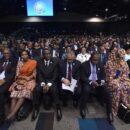‘Don’t Force Statehood on Somalia’ – in defence of Richard Dowden – by Prof Said Samatar

 My initial impulse in perusing Richard Dowden’s piece “˜Don’t Force Statehood on Somalia’ was to cry “BLOODY MURDER!”–he must, as I have persuaded myself, have had access to an article I penned a couple of years back entitled “America, Pray Leave Somalia to its Own Devices”(published first in Journal of Contemporary African Studies, v. 28, no. 3 July 2009. 313-323.) But I then realized that certain temperaments tend to come up with identical visions/solutions without knowing of each other! Don’t just laugh here, gawk! His suggestions for nudging wayward Somalia towards a workable political solution happen to match my own – step for step, strategy for strategy, concept for concept. Only I didn’t bring in the Swiss as a model.
My initial impulse in perusing Richard Dowden’s piece “˜Don’t Force Statehood on Somalia’ was to cry “BLOODY MURDER!”–he must, as I have persuaded myself, have had access to an article I penned a couple of years back entitled “America, Pray Leave Somalia to its Own Devices”(published first in Journal of Contemporary African Studies, v. 28, no. 3 July 2009. 313-323.) But I then realized that certain temperaments tend to come up with identical visions/solutions without knowing of each other! Don’t just laugh here, gawk! His suggestions for nudging wayward Somalia towards a workable political solution happen to match my own – step for step, strategy for strategy, concept for concept. Only I didn’t bring in the Swiss as a model.
Mr. Dowden does not need my help, as he is surely capable of defending his small niche of an argument – or to pastoralize it – to protect his herd of camels against tribal interlopers. Still, in pointing to Switzerland as a potential political model for Somalia Mr. Dowden, if I understood him, was uninterested in tracing the torturous route by which Switzerland became Switzerland, nor in trying to draw a comparative parallel in the histories of the Swiss and hapless Somalis. He was only, again if I understood him, referring to the tiny mountainous, heterogeneous country’s success in creating for itself autonomous communities of prosperous self-governing units, thereby becoming the “˜Wunderkind’ of Europe. Since all attempts at centralizing Somalia have so far failed, he seems to be saying, why not try something new, something similar to the “Swiss model?”
Two further points. One is a trifling kvetch: the word Gurti – elder for Somali and spelt “˜Guurti’ – was NOT used by the British during their tenure of northern Somalia. It is of more recent coinage. Instead, the British preferred the Arabic ‘Aaqil (sg) ‘Uqaal (pl).
The other is more serious and would have rendered Mr. Dowden’s points unchallengeable had he recollected it. He refers to the “fertile” inter-riverine region of southern Somalia. And it is a fact that the only piece of rich real estate that Somalia boasts happens to be this part. In the early 1970s a Somali-government commissioned Chinese team concluded that 50m farmers could comfortably live off this strip of territory. Allowing for the Chinese team’s assumption in the equality of farming skills between Chinese and Somalis (gawk again!), my own personal experience in the area tends to support the Chinese assessment. Again in the early 70s I used to run an adult night school in the port town of Kisimayu right in the heart of this region. My colleagues and I used to take pleasure excursions into the surrounding countryside. What we witnessed was a land unlike any in the rest of Somalia – a land covered with brilliantly swaying-in -the-wind woodlands teeming with domestic and wild life – myriad numbers of camel and cattle herds, flocks of sheep and goats, huge elephant herds, vast herds of ostriches, multiple prides of lions, leopards, cheetahs – the whole works. A very Serengeti-like environment, if you will. Much of this world has of course now vanished, wiped out almost to extinction by violent uncontrolled Somalis wielding AK-47s. (Whoever gave AK-47s to Somalis has committed an unpardonable sin against Somalia!) The land is now denuded of the woodlands, the big trees mowed down to be sold as commercial charcoal to the Emirate markets and beyond. Still, it remains the prime real estate in Somalia.
Why then, Mr. Dowden, should have asked, is this most fertile region inhabited by a perennially starving, famine-haunted population? The answer is as straight as it is terrifying. What nobody seems to know is that southern Somalia is an occupied territory -occupied in precolonial times by the predatory pastoral clans of Dir, Daarood and Hawiye who rapaciously preyed on the pacific peasant population of Bantu, Oromo, and Raxanwayn, etc. Then the Italians followed on their footsteps to conquer and occupy the Bantu and Raxanwayn, pastoralists, too, for good measure, and then conscripted the lot as slave laborers to work on their vast banana plantations. Then the successor national state that was born in 1960 from the merger of former British and Italian Somalilands, dominated by pastoralists, and therefore unsympathetic to this region, continued apace the oppression of the local population. Then Gen. M. Siyaad Barre’s totalitarian military regime took oppression of the region to new heights, then in the wake of Barre regime’s collapse in January, 1991, and the disintegration of Somalia into civil anarchy, the hordes of the late and unlamented Gen. M. F. Aydiid moved in, ravishing and raping the region. And now al-Shabaab Islamist thugs equally addicted to slicing off limbs of supposed refractors and gang-raping, first, 13-year-old lasses, then accusing them of adultery and publicly stoning to death these defenseless children in the market place.
If Mr. Dowden drew attention to the dramatic contrast between the arid unyielding but thriving autonomous, self-governing north and northeastern regions on the one hand and the fertile but starving occupied south, his argument calling for a Somalia of loosely connected self-governing entities would have been untouchable!
Finally, I gained a number of valuable insights from the two critical responses. What I miss in them is the kind of concrete proposals that Mr. Dowden puts forward. It is one thing to attack another’s ideas, another to put something tangible on the table! Perhaps it should be made a law that nobody without concrete submissions should enter this site!
Further, for the record there was, to my knowledge, no centralized state system in precolonial Somalia. The nearest thing to an organized state system in precolonial Somalia were the little eastern coastal sultanate of the Majeerteen Boqor, or Sultan ‘Ismaan Mahamuud and his enterprising usurpist nephew Yusuf Ali Keenadiid, who occupied the Hawiye lands around the southeastern coastal town of Hobyo(Obbia) and oppressed the natives there. (Incidentally, both of these statelets’ economies prospered mightily on plundering traffic on the shipping lanes of the Indian Ocean. Some things , apparently, never change. And in the west the tiny kinglet of the Ujuuraan led by the noble clan of the Gareen in the upper reaches of the Shabelle, or the River of Leopards, which was certainly no empire. (If anyone is in a mood to look into the Ujujuuraan further, they might start consulting a book coathored by David Laitin and myself, entitled Somalia: a Nation in Search of a State, Pp. 15-17.
Coda: I loathe to take sides in debates but this time around my love of justice gets the better of me: The use of the word “cliché” in description of Dowden’s entry strikes me oddly. Cliché, as I understand it, is a word, phrase or concept that has lost its original power of validity through overuse or indiscriminate repetition. If so, it doesn’t apply to Dowden’s piece. If anything, his commends itself for its iconoclastic freshness.
Said Samatar teaches in the history department of Rutgers University






